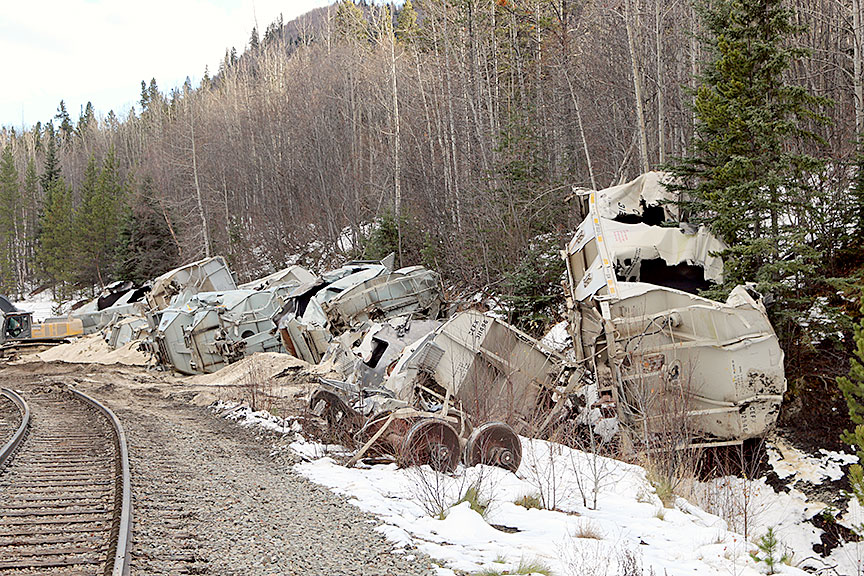Main-track derailment
Canadian National Railway Company
Freight train A45851-29
Mile 96.38, Grande Cache Subdivision
near Grande Cache, Alberta
The occurrence
On , at approximately 1953 Mountain Daylight Time, northbound Canadian National Railway Company freight train A45851-29, travelling at 27 mph, derailed 28 cars in a right-hand curve at Mile 96.38 of the Grande Cache Subdivision. The derailed cars were covered hopper cars loaded with frac sand. The derailment damaged about 1300 feet of track. There were no injuries
Media materials
News release
Lack of risk assessment among factors leading to 2016 CN derailment near Grande Cache, Alberta
Read the news release
Deployment notice
TSB deploys a team of investigators to a derailment near Grande Cache, Alberta
The Transportation Safety Board of Canada (TSB) is deploying a team of investigators to a derailment involving a Canadian National freight train that occurred on 29 October 2016, near Grande Cache, Alberta. The TSB will gather information and assess the occurrence.
Download high-resolution photos from the TSB Flickr page.
Class of investigation
This is a class 3 investigation. These investigations analyze a small number of safety issues, and may result in recommendations. Class 3 investigations are generally completed within 450 days. For more information, see the Policy on Occurrence Classification.
TSB investigation process
There are 3 phases to a TSB investigation
- Field phase: a team of investigators examines the occurrence site and wreckage, interviews witnesses and collects pertinent information.
- Examination and analysis phase: the TSB reviews pertinent records, tests components of the wreckage in the lab, determines the sequence of events and identifies safety deficiencies. When safety deficiencies are suspected or confirmed, the TSB advises the appropriate authority without waiting until publication of the final report.
- Report phase: a confidential draft report is approved by the Board and sent to persons and corporations who are directly concerned by the report. They then have the opportunity to dispute or correct information they believe to be incorrect. The Board considers all representations before approving the final report, which is subsequently released to the public.
For more information, see our Investigation process page.
The TSB is an independent agency that investigates air, marine, pipeline, and rail transportation occurrences. Its sole aim is the advancement of transportation safety. It is not the function of the Board to assign fault or determine civil or criminal liability.
